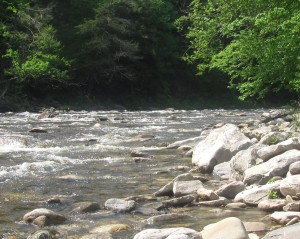DEP always granted Marcellus drillers’ requests to avoid Act 13’s stream buffers
-
Marie Cusick
The state Department of Environmental Protection (DEP) says it has never denied a request by a Marcellus shale driller to circumvent the stream setback requirements in Act 13.
Parts of the 2012 oil and gas law were struck down by the state Supreme Court last month, including the stream and wetland setback requirements.
The court held that since it was so easy for companies to bypass the setback rules, the law violated the environmental rights of Pennsylvanians. At issue was the fact that Act 13 allowed the DEP to waive the setbacks, as long as a company submitted a plan showing it would take adequate measures to protect waterways.
DEP’s Deputy Secretary for Oil and Gas Management, Scott Perry, says although the department has never denied a waiver request from a Marcellus driller, it has worked cooperatively with companies to protect waterways.
“We’ve been able to modify where well sites were able to go,” he tells StateImpact Pennsylvania. “We’ve been able to strengthen erosion and sediment control plans and other pollution and prevention control plans.”
Perry believes Act 13 gave the DEP the ability to enforce the setbacks and did not require the department to automatically approve waiver requests from drillers.
“We’ve always interpreted that law to give us the authority to deny [waiver requests], when appropriate,” he says.
The setbacks, which were struck down by the court, required unconventional gas wells to be at least 300 feet from streams and wetlands, with the edge of the well site at least 100 feet away:
According to the DEP, the number of companies seeking to avoid the setbacks was relatively small. Last year, 74 unconventional gas well sites received DEP waivers. Those sites contained 147 individual gas wells– a small fraction of the roughly 3,000 well permits issued by the department in 2013.


















